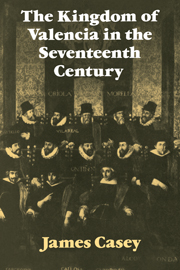Book contents
- Frontmatter
- Contents
- List of illustrations
- Preface
- Abbreviations
- A note on measures
- Map of the kingdom of Valencia
- Introduction
- 1 A long depopulation
- 2 Rich and poor
- 3 The decline of agriculture
- 4 Paying their way in the world
- 5 The seigneurial reaction
- 6 The bankruptcy of the senyors
- 7 The eclipse of the Popular Estate
- 8 The rule of the judges
- 9 Outlaws and rebels
- 10 The loyal kingdom
- Conclusion
- Appendix 1 Fluctuations in the tithes 1500–1700
- Appendix 2 The exploitation of a Valencian senyoriu: the marquesate of Lombay 1559–1700
- Appendix 3 Approaches to a budget for the Dukes of Gandía 1605–99
- Appendix 4 List of viceroys 1598–1700
- Bibliographical note
- Index
- Frontmatter
- Contents
- List of illustrations
- Preface
- Abbreviations
- A note on measures
- Map of the kingdom of Valencia
- Introduction
- 1 A long depopulation
- 2 Rich and poor
- 3 The decline of agriculture
- 4 Paying their way in the world
- 5 The seigneurial reaction
- 6 The bankruptcy of the senyors
- 7 The eclipse of the Popular Estate
- 8 The rule of the judges
- 9 Outlaws and rebels
- 10 The loyal kingdom
- Conclusion
- Appendix 1 Fluctuations in the tithes 1500–1700
- Appendix 2 The exploitation of a Valencian senyoriu: the marquesate of Lombay 1559–1700
- Appendix 3 Approaches to a budget for the Dukes of Gandía 1605–99
- Appendix 4 List of viceroys 1598–1700
- Bibliographical note
- Index
Summary
It has become fashionable in recent years to link depopulation in traditional societies with a narrowing of the gap between rich and poor. Le Roy Ladurie has made us familiar with the growth of a comfortable middling peasantry in the depopulated Languedoc of the fifteenth century; and Vilar has hinted at a somewhat similar picture for rural Catalonia in the wake of the Black Death, with the survivors of the epidemic tending to regroup and concentrate their holdings. But it would be difficult to paint the age of the later Habsburgs in the same golden hues. Caxa de Leruela, writing in 1632, noted how the depopulation of Castile went hand in hand with the squeezing out of the middling, active peasantry, to the benefit of the very rich. Indeed, even in France the demographic stagnation of the seventeenth century brought more, not less inequality in landholding.
The problem in analysing Spanish developments, of course, is the extreme paucity of quantitative studies. The materials are fragmentary, often repellent because of the long drudgery of calculations, and always dangerous given the sheer inadequacy of much of the information. The sources for a study of property in Habsburg Valencia can be grouped under four headings. The most useful is undoubtedly the peyta, a tax levied on all forms of visible property, principally land but also houses, mills, herds and the like.
- Type
- Chapter
- Information
- The Kingdom of Valencia in the Seventeenth Century , pp. 35 - 51Publisher: Cambridge University PressPrint publication year: 1979



